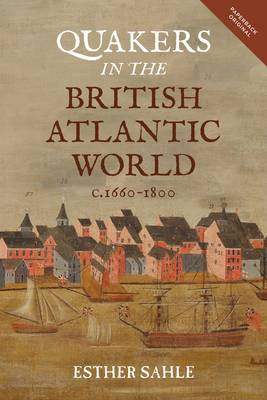
Bedankt voor het vertrouwen het afgelopen jaar! Om jou te bedanken bieden we GRATIS verzending (in België) aan op alles gedurende de hele maand januari.
- Afhalen na 1 uur in een winkel met voorraad
- In januari gratis thuislevering in België
- Ruim aanbod met 7 miljoen producten
Bedankt voor het vertrouwen het afgelopen jaar! Om jou te bedanken bieden we GRATIS verzending (in België) aan op alles gedurende de hele maand januari.
- Afhalen na 1 uur in een winkel met voorraad
- In januari gratis thuislevering in België
- Ruim aanbod met 7 miljoen producten
Zoeken
Omschrijving
The book studies the two largest Quaker communities in the early modern British Atlantic World, London and Philadelphia. It looks at the origins of the Society of Friends in mid seventeenth century England and follows its development into a well organised sect with a sophisticated organisational structure spreading across the Atlantic world. The book zooms in on the Quaker communities in these two important port cities, as well as their relationships with non-Quaker inhabitants. It scrutinizes the role of Quaker merchants and the business ethics they followed.
Drawing on many unpublished sources, the study is able to portray a mid-eighteenth-century crisis for the Quaker communities when sanctions for offences against the prevailing disciplines in business (fraud, debt, bankruptcy) and marriage increased dramatically. And yet these Quaker communities got likewise caught up in wider political developments across the British Empire. In the course of a series of conflicts affecting colonial Pennsylvania in the mid eighteenth century, the Society of Friends suffered grave reputational damage. The public in England and Pennsylvania began to perceive Quakers as a sect that put its own agenda and interest over the welfare of the colonial population and the Empire. In turn, these developments led to a "Quaker reformation" and Quaker identity became guided by new principles: honesty in business and religious marital endogamy. The book will be of interest to scholars and students of economic and Atlantic history, as well as Eighteenth-Century studies and religious history.
Drawing on many unpublished sources, the study is able to portray a mid-eighteenth-century crisis for the Quaker communities when sanctions for offences against the prevailing disciplines in business (fraud, debt, bankruptcy) and marriage increased dramatically. And yet these Quaker communities got likewise caught up in wider political developments across the British Empire. In the course of a series of conflicts affecting colonial Pennsylvania in the mid eighteenth century, the Society of Friends suffered grave reputational damage. The public in England and Pennsylvania began to perceive Quakers as a sect that put its own agenda and interest over the welfare of the colonial population and the Empire. In turn, these developments led to a "Quaker reformation" and Quaker identity became guided by new principles: honesty in business and religious marital endogamy. The book will be of interest to scholars and students of economic and Atlantic history, as well as Eighteenth-Century studies and religious history.
Specificaties
Betrokkenen
- Auteur(s):
- Uitgeverij:
Inhoud
- Aantal bladzijden:
- 218
- Taal:
- Engels
- Reeks:
- Reeksnummer:
- nr. 18
Eigenschappen
- Productcode (EAN):
- 9781783275861
- Verschijningsdatum:
- 21/05/2021
- Uitvoering:
- Paperback
- Formaat:
- Trade paperback (VS)
- Afmetingen:
- 150 mm x 226 mm
- Gewicht:
- 362 g

Alleen bij Standaard Boekhandel
+ 74 punten op je klantenkaart van Standaard Boekhandel
Beoordelingen
We publiceren alleen reviews die voldoen aan de voorwaarden voor reviews. Bekijk onze voorwaarden voor reviews.









